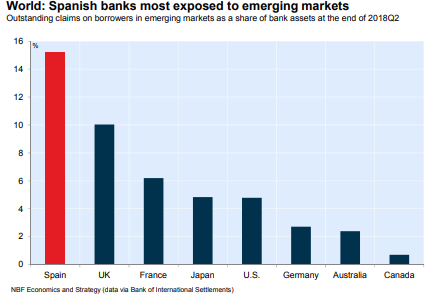Emerging Market Country Debts Are A Serious Problem, Particularly For The European Banks
“Emerging markets have rarely looked as vulnerable…The stock market slump and sharp currency depreciations coincide with the deceleration of capital inflows into emerging economies this year. Foreign investor sentiment was no doubt affected by Washington’s trade protectionism and the tightening of monetary policy by the Federal Reserve which is raising the cost of borrowing worldwide (via rising bond yields) and giving a lift to the U.S. dollar. This is a double whammy for emerging economies which have not only seen debt climb to record levels, but also massive USD-denominated corporate debt issuance.” (National Bank of Canada, Monthly Economic Monitor, November 2018)
Over the past ten years there was a rush of easy money pouring into the emerging market countries. These countries, which feasted on the cheap money due to US quantitative easing and near-zero interest rates, are now suffering from a withdrawal of international liquidity. Higher interest rates along with the US led trade wars have started a stampede of funds out of the emerging markets.
The trade war is also hurting emerging countries as they are finding it more expensive to export to the US. The strengthening US dollar made matters worse since much of their debt is denominated in the US currency.
While the story varies by country, the Turkish lira and Argentine peso have crashed, and China's stock market seems to be in a bear market. South Africa, Ukraine, Mexico, Indonesia, and Brazil are all dealing with depreciating currencies because of worries about their stability in a world economy destabilized by tariffs.
Not all emerging market countries are feeling the pain equally. For example, South Korea and Thailand seem to be weathering the storm relatively well. This represents quite a change from two decades earlier when the Asian financial crisis began with the implosion of the Thai currency.
Nonetheless, as many have observed, the negative events overtaking Turkey and Argentina almost represent a textbook case study in what can go wrong.
Both countries racked up substantial foreign denominated debt, have limited foreign currency reserves, are experiencing high inflation, and are running large budget and trade deficits. And in both cases, the access to foreign capital has suddenly dried up.

Disclosure: None.



